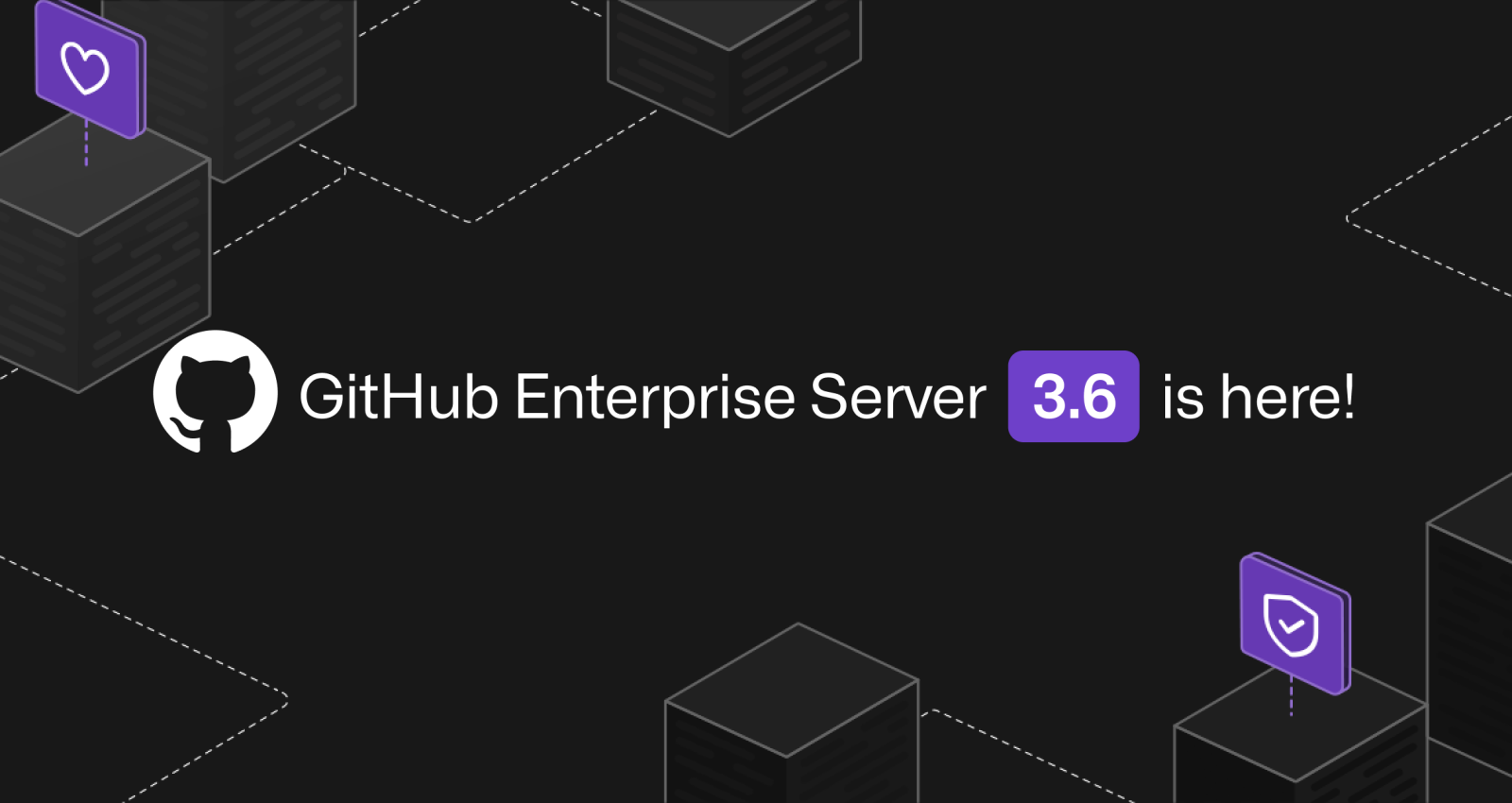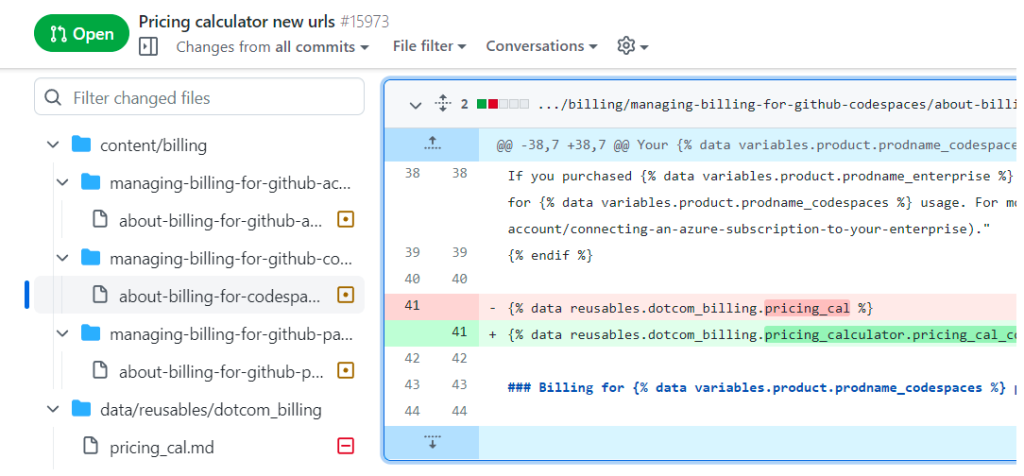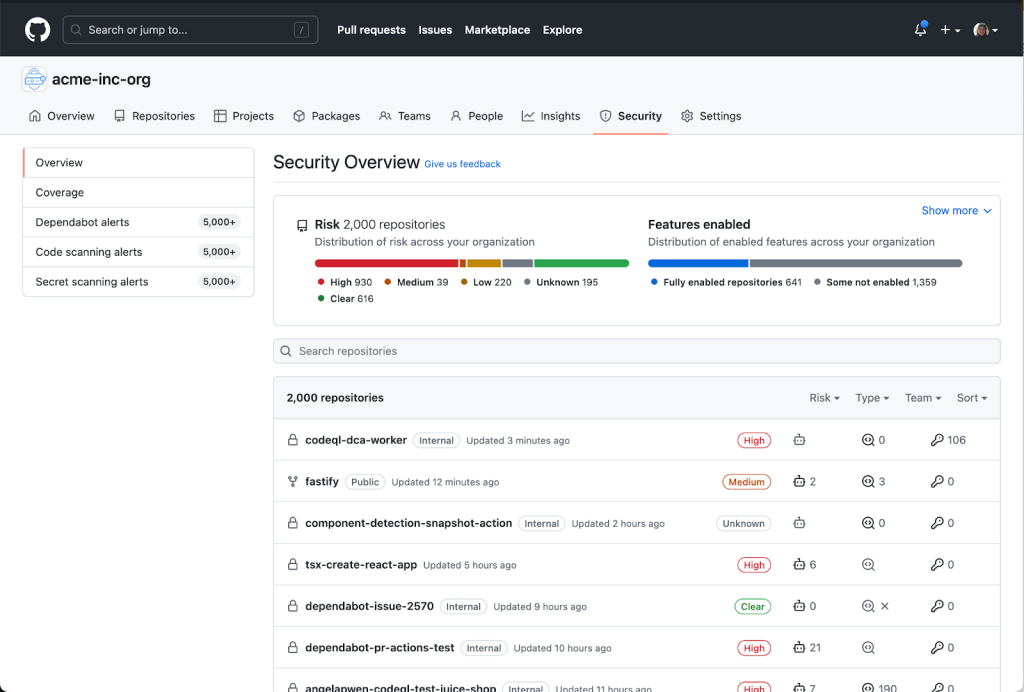GitHub Enterprise Server 3.6 is now generally available
GitHub Discussions and Audit Log Streaming, new automation features, and security enhancements are available now in GitHub Enterprise Server 3.6.

GitHub Enterprise Server 3.6 is now generally available. With a host of improvements for developers, security and administration teams, this update makes developing secure software easier for everyone.
It brings more than 60 new features, including:
- GitHub Discussions
- Repository cache (#462)
- Audit log streaming (#344)
- Pull Request File Tree view (#457)
- Server Statistics (#527)
GitHub Advanced Security customers will also now see all alert types in the enterprise level security overview, and this release makes it easier to break a build when a vulnerable dependency is introduced.
For help upgrading, use the Upgrade Assistant to find the upgrade path from your current version of GitHub Enterprise Server to your desired version.
GitHub Discussions brings a dedicated home for developing ideas
Creating software today takes so much more than just code. Teams need to gather and develop ideas, talk about roadmap items, discuss feature requests, and keep a record of their decisions. All of that typically involves going from your repository to a chat app, email or your knowledge management system.
GitHub Discussions cuts down on context switching and helps bring your ideas next to your code. It provides a dedicated place to discuss ideas and answer questions, while keeping your GitHub Issues focused on capturing work and plans.

Navigate pull requests more quickly with the file tree
Reviewing large or complex pull requests can be difficult, but the new file experience makes it easier. Developers can use the file tree to quickly jump between files and understand the scope of a review in a glance.

What’s more, GitHub now verifies Git commit signatures and shows commits as “verified” even if the developer’s public GPG signing keys are expired or revoked (but, not compromised). And with the ability to grant GitHub Apps exceptions to branch protection rules, administrators can now build automation on top of compliant policies with ease.
Secure and audit your enterprise using industry standards
GitHub Enterprise Server 3.6 brings the ability to stream audit logs to a dedicated log collection system. With streaming, security teams can be sure they will never lose an audit log event, while using the SIEM systems they’re most comfortable with to conduct investigations. Read more about audit log streaming.
This release also comes with a host of small changes to help companies keep their instance secure. From removing insecure SSH keys and protocols from Git, to enforcing TLS encryption for incoming SMTP connections, GitHub Enterprise Server 3.6 can be configured to meet your compliance requirements.
Serve global CI farms without slowing down developers
Many organizations have CI farms distributed around the world, which need to be fed with fast updates. But CI runners often drive the lion’s share of load on a Git server, and a large enough farm of CI runners can cause slowdowns for Git users.
The GitHub Enterprise Server Repository Cache enables operators to update distributed CI farms with an eventually-consistent replica of your Git data, enhanced with data locality policies. Launched as a beta last year, it’s generally available in this release. Read more about the repository cache.
The power of shared data with Server Statistics
Ever wondered how teams and projects across your GitHub Enterprise Server instance, or instances, are operating? Now, you have that insight with the addition of Server Statistics.
Server Statistics collects key aggregate metrics from across server instances—to help administrators anticipate the needs of their organizations, understand how their teams work, and show the value the company gets from GitHub Enterprise Server.
The power of shared data helps us build a better GitHub, by providing us with high-level data that helps us understand how GitHub Enterprise Server is used.
With Server Statistics enabled, 41 metrics are available via your connected GitHub Enterprise Cloud account-via a REST API, or CSV or JSON. Read more about Server Statistics.
Advanced Security brings new visibility and power to the enterprise
GitHub Enterprise Server 3.6 contains a wealth of updates for GitHub Advanced Security customers. Here are a few highlights. You can check out the release notes for much more.
The enterprise-level security overview page now includes all alert types (beta)
The security overview page now includes Dependabot and code scanning alerts at the enterprise level, providing a single place to view all security alerts across your codebases.

It’s easier to break a build that contains a vulnerability with new dependency review features (beta)
Developers routinely update their dependencies, but it can be hard to understand what changed in a large manifest or lock file. With a new dependency review API and action, users can configure dependency review enforcement to prevent vulnerable dependencies from making it into their codebase.
Secret scanning custom patterns at the enterprise level can now be dry run (beta)
Dry runs enable administrators to understand a custom pattern’s impact across the entire enterprise, and hone the pattern before publishing and generating alerts.
Code scanning alerts can be dismissed with a comment
When dismissing a code scanning alert, developers can now provide a reason for the dismissal.
Try it out today
To learn more about GitHub Enterprise Server 3.6, read the release notes and download it now.
Not using GitHub Enterprise Server already? Start a free trial to innovate faster with the platform developers know and love.
Tags:
Written by
Related posts

GitHub availability report: January 2026
In January, we experienced two incidents that resulted in degraded performance across GitHub services.

Pick your agent: Use Claude and Codex on Agent HQ
Claude by Anthropic and OpenAI Codex are now available in public preview on GitHub and VS Code with a Copilot Pro+ or Copilot Enterprise subscription. Here’s what you need to know and how to get started today.

What the fastest-growing tools reveal about how software is being built
What languages are growing fastest, and why? What about the projects that people are interested in the most? Where are new developers cutting their teeth? Let’s take a look at Octoverse data to find out.